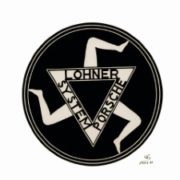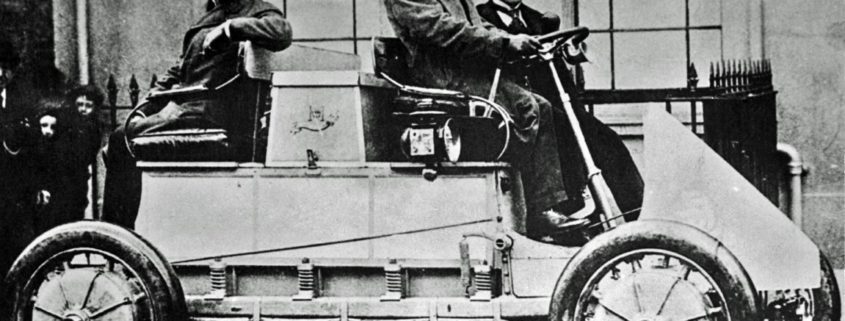The world´s first four-wheel drive car was a Porsche

Logo System Lohner Porsche
The Lohner-Porsche, a vehicle that was far ahead of its time … just as its inventor Ferdinand Porsche. As early as 1897, Porsche designed a wheel hub motor for the purveyor to the imperial household Jacob Lohner on behalf of the „Jacob Lohner & Co.” imperial coachbuilding works in Vienna. Two years later, the young engineer astounded the automotive world at the World’s Fair in Paris with his „System Lohner-Porsche” electro-automobile. It was built mostly of wood and was powered by hub motors on the front wheels. The built-in internal pole electric motors in the hubs delivered an output of around 3 hp each (briefly 7 hp). Its operating time was about three hours (44-cell lead-acid battery with 80 volt voltage); the maximum speed of the 980 kg car lay between 45 and 58 km/h.
Porsche’s creative urge reached its first peak around 1900. In a few months he anticipated the development of automobiles in the next 120 years: first with the development of an electric car, then a hybrid car. This evolution culminated in the further development of the electric vehicle into the „Lohner-Porsche race car” – the world’s first vehicle that was also powered by all four wheels. All-wheel drive was born!
The four-wheel drive electric race car was designed specifically for a British customer named E.W. Hart. (In the article picture Ferdinand Porsche is sitting next to the customer E.W. Hart). Ferdinand Porsche called the car „La Toujours Contente” (the always content) – in reference to two electric vehicles from other manufacturers, the „La Jamais Contente” (the never content) and the „La Presque Contente” (the almost content). The vehicle featured four 1500W hub motors. Since the batteries of the day could not store much energy, the weight of the batteries increased from 410 to 1800 kg. The race car looked like „a battery box on wheels”. It is notable that the battery container was suspended by coil springs, so that the sensitive battery cells were protected from road shocks.
Ferdinand Porsche was known for testing his designs himself, even in races. He entered a race with the Lohner-Porsche racing car in Chislehurst, England in 1900.
Porsche’s design principle of the four-wheel drive car was used on the moon 70 years later in NASA´s lunar car.
The Lohner-Porsche Mixte (1901) is on display in the Ferdinand Porsche Erlebniswelten fahr(T)raum in Mattsee.
Quellen
Ludvigsen, Karl (2010): Genesis eines Genies
Ferdinand Porsche Der Erfindergeist
Lohner Porsche, Fahrzeuge die Ihrer Zeit weit vorraus waren
Jelinek, Gerhard (2015): Sternstunden Österreichs. Die helle Seite unserer Geschichte. Der erste Porsche fährt elektrisch
Lohner Porsche erstes hybridauto erstmals Allrad-Antrieb
Bilder, https://commons.wikimedia.org/wiki/File:Lohner_Porsche.jpg







Opening of the Austro-Daimler ADS-R „Sascha” special exhibition
/w Bez kategorii, Geschichte, Lebensstationen, Rennautos, SonderausstellungOn March 22, the special exhibition of the legendary „Sascha” race car in the Ferdinand Porsche Erlebniswelten fahr(T)raum Mattsee was ceremoniously opened with a vernissage by Oskar Pointecker. „We do not see ourselves here at fahr(T)raum as museum, but as a living exhibition. Everything is in motion here. All of our cars are street-ready and […]
The best quotes and sayings from Ferdinand Porsche
/w Bez kategorii, Geschichte, LebensstationenFerdinand Porsche (1875-1951) was undoubtedly a technical genius, a gifted designer and a creative engineer. He invented the wheel hub motor, developed the world’s first hybrid car (Lohner Porsche Mixte), designed cars as well as trucks and tractors for agricultural and military use. Many achievements, such as the award of an honorary doctorate and the […]
Gunter Haug reads from his book „Ferdinand Porsche – Ein Mythos wird geboren”
/w Bez kategorii, Geschichte, LebensstationenOn 15 March we will be welcoming Gunter Haug to fahr(T)raum Mattsee. The author will perform a reading of his work „Ferdinand Porsche – Ein Mythos wird geboren / A myth is born” in German at 7:30 pm. The newspaper, radio and television editor and author of more than 30 books has dealt with the […]